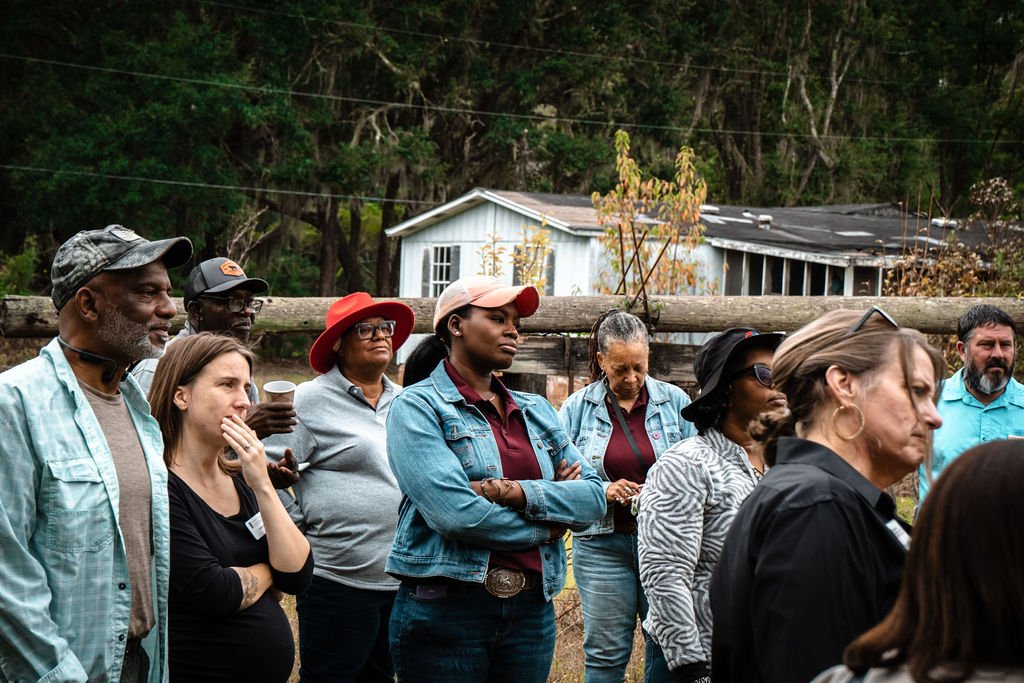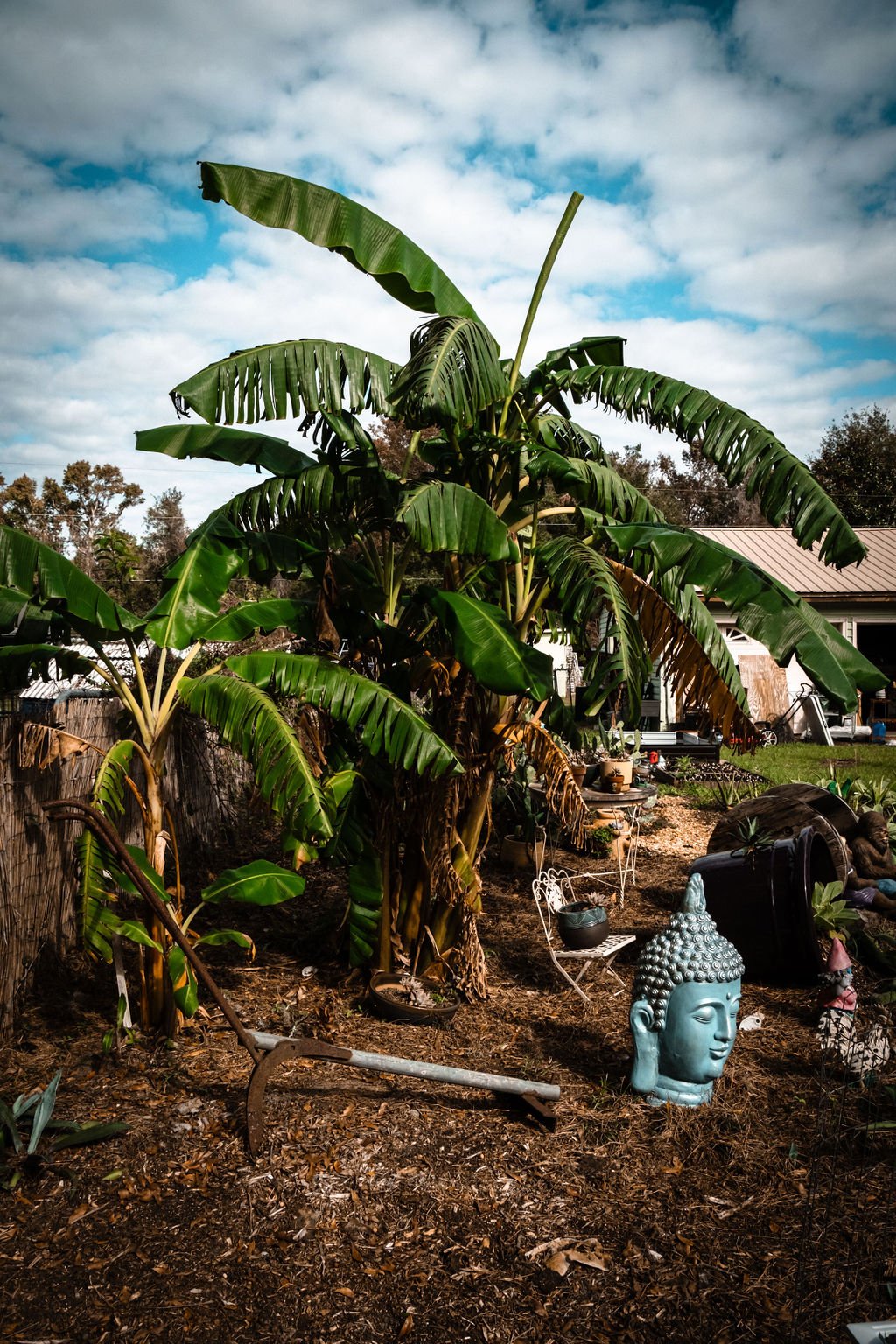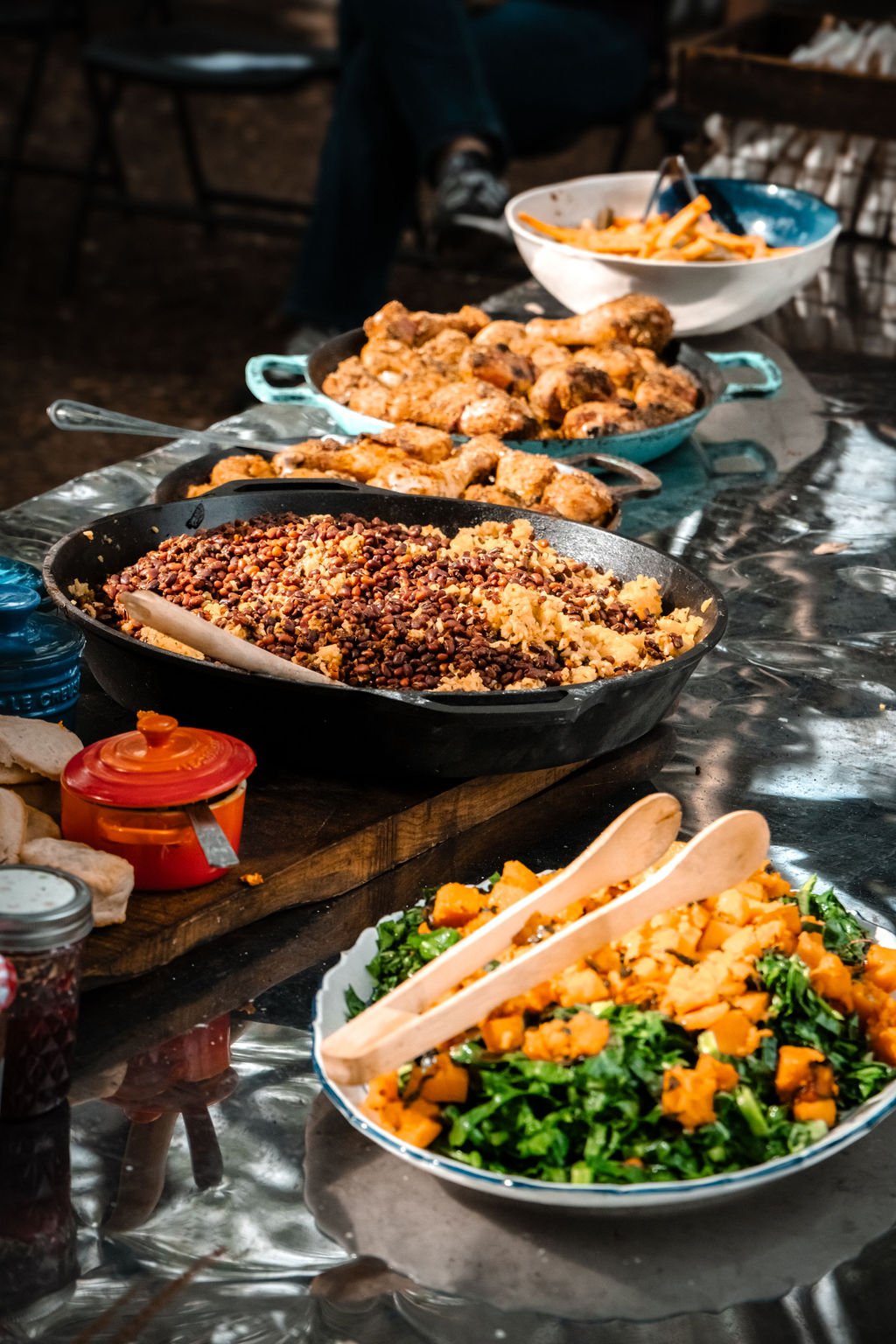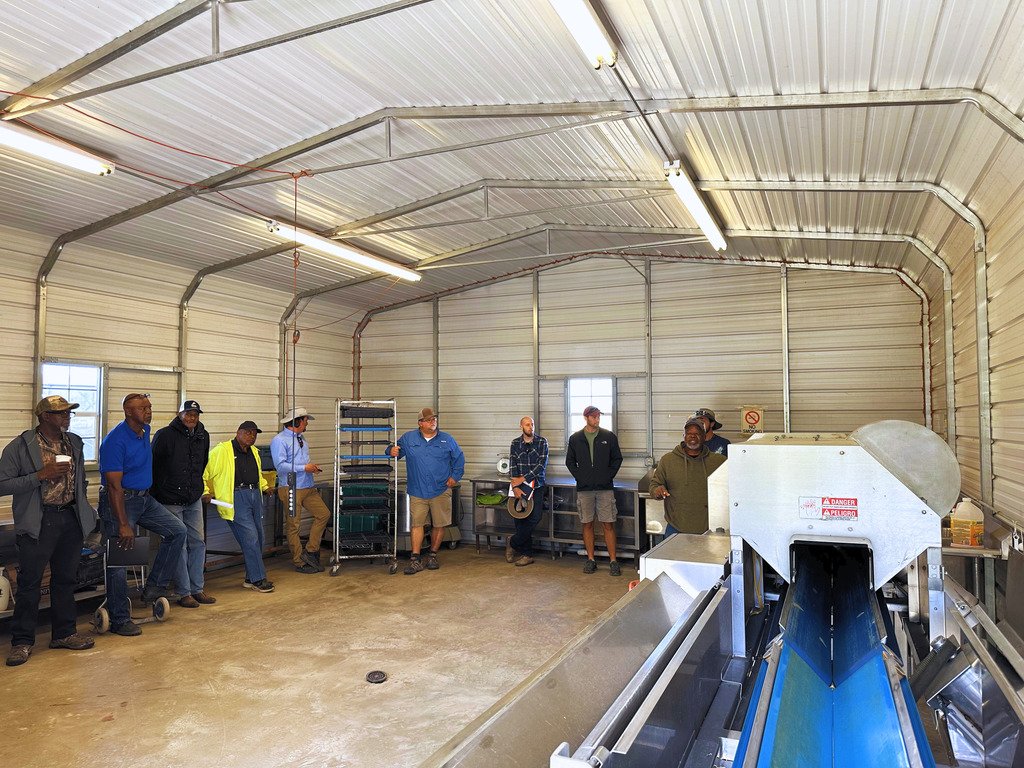By Paul Sorah
Paul Sorah is Georgia Organics‘s Climate Smart Agricultural Specialist
On March 11, 2024, Georgia Organics hosted an H-2A Employee Management Practices Farmer Field Day at Jenny Jack Farm in Pine Mountain, GA as the final installment in the Winter Farmer Series. Attendees enjoyed a farm tour from owners Jenny and Chris Jackson as they discussed farm operations, production methods, and labor management in relation to their newly hired H2A employees. In addition, a representative from AgWorks, a masLabor company, presented a detailed overview of H-2A employment guidelines and how their company, as an H-2A agent, can help navigate the complex government processes involved to secure reliable, seasonal labor.
Jenny Jack Farm Tour on Production Practices
About an hour southwest of Atlanta, you’ll find Jenny Jack Farm, in lovely Pine Mountain, Georgia. Jenny and Chris Jackson, along with their three H-2A employees produce a diverse variety of fruits, vegetables, herbs, and flowers on six acres of cultivation. A mix of field production, caterpillar tunnels, high tunnels, and a climate-controlled greenhouse allow year-round production that keeps their loyal CSA and on-farm store customers happily stocked up through each season. Chris and Jenny pride themselves on feeding the local community, and rightfully so, as all of the food produced is sold within 30 miles of the farm. A 300-member CSA drives the majority of their revenue along with an on-farm market and a few restaurants to fill the gaps. After eighteen years of farming, the duo has experienced the full gamut of the undeniable grind the business bestows, but they feel they’ve found a new sweet spot, in large part due to the pursuit of the H-2A employer program.
Entrance to Jenny Jack Farm. Photo by M.F. Espinoza
A cold, clear morning welcomed attendees as coffee cups were filled, and folks gathered around a fire to mingle and settle in. Chris and Jenny were already busy making flower bouquets destined for a local grocery store. The work never really stops, so it was quite gracious of the two farmers to give the group so much time and insight into their operation. Chris kicked off the farm tour with a walk through a field of newly planted greens, lettuces, turnips, spinach, onions, garlic, and carrots. Different crop planting methods were discussed including direct seeding, hand transplanting, and paper pot transplanting. Chris noted that the paper pot transplanter system is a real asset in efficiency for turnips, spinach, and scallions. The strawberry crop was close by and had just been weeded, then tucked back under row covers to protect the early flowers and fruits. The use of frost cloth (1.5 oz+) over the plants allows for delicious, ripe strawberries three - four weeks earlier than with uncovered plants and are a real treat for their customers anxiously awaiting these seasonal highlights.
Views from the field. Photos by M.F. Espinoza
When farmers talk production, an inevitable topic is weeds. Especially in organically managed systems, this is a critical, make or break aspect of an operation that requires efficient execution to ensure successful crop health and yields. Very often, field and weed maintenance is done by hand but sometimes, as is the case with Jenny Jack Farm, mechanical methods of field cultivation are used. Chris gave a valuable look into his systems for weed management on the farm showing attendees their go-to-tool for field cultivation—the Farmall tractor. Using different belly-mount attachments based on crop type, size, and spacing, these tractors have wide tire spacings, open bottoms, and allow the operator to straddle the planting rows or beds while the in-row cultivation action is right under their feet with a clear view. Other implements can be mounted on the rear 3-point hitch to assist with walkway and tire tread cultivation.
Silage tarps are also used around the farm to create stale seed beds for direct seeding and transplanting. These large, heavy-duty, plastic tarps are white on one side and black on the other. The field is prepared for planting, and the tarps are laid on the ground and weighed down with rocks or sandbags. With the black side facing up, the sun will heat the soil to much higher temperatures than they’d naturally maintain forcing weed seeds to germinate. With the high temperatures and lack of sunlight, the newly germinated weeds will die off, creating a clean canvass to plant or direct seed into within 2-3 weeks of use.
Not to be forgotten, cover crops also play a key role in the soil health development and weed suppression system on the farm. While cover crops protect the soil from elemental exposure and erosion, they also work to feed the soil and suppress weeds. As the cover crops grow in size, ideally their canopy will shade out unwanted weeds and outcompete with them for nutrients. Then as cover crops mature and they are terminated and acclimated into the soil, the nutrients that they’ve foraged in their roots and foliage are released back into the soil. By using silage tarps in this process on top of the integrated cover crop, Chris and Jenny are able to accelerate the cover crop breakdown timeline once acclimated in the soil for more readily available nutrients needed in the cash crops to follow. Long handle cultivating tools and hand weeding still have to be implemented as needed.
Chris spoke to how important consistent carrot crops are to their revenue and customer satisfaction but acknowledged what a fight weed pressure can be in production. He has successfully integrated a flame weeder that’s primarily homed in the carrot production system. On top of the other weed management steps, the flame weeder is used on the seeded carrot beds just before carrot seed emergence. The propane powered flame weeder is rolled over the bed and burns out weed seeds that have popped up before the carrots. Although this does not eliminate future cultivation steps in the crop, it does allow the carrots a head start to establish a quality stand.
Silage tarp applications around the farm. Photos by M.F. Espinoza.
Season extension plays a vital role in the Jenny Jack Farm model. By using various models and sizes of tunnels, they can push crops early and late. Crop consistency is considered a key driver in the farm’s high-retention rate for the CSA. By knowing what items their customers want, they can leverage protected growing spaces to meet the demands outside of the traditional season expectations. Lettuce and arugula are grown year-round for this reason. The tunnels provide the warmer climate needed in the winter to maintain production while low-tunnel shade structures are used in the field during the heat of summer. PVC pipe is used to make hoops over the beds, shade cloth is secured over top, and with the micro irrigation sprinklers work together to cool the soil, air, and plants underneath. At the time of the field day, overwintered scallions, chard, lettuce, kale, and an assortment of other greens were vibrant in the tunnels. The houses will transition into tomatoes, peppers, eggplant, and cucumbers for spring and summer production.
Of note, Chris mentioned a research project the farm is participating in that is trialing a full coverage shade cloth on a high tunnel as insect netting for growing a late, non-pollinating cucumber. The early results are impressive as he praised and credited this system for his first high-yielding late cucumber crop with no pickle worm problems, which are typically detrimental to gourd production in the fall in this region.
Different tunnels used in production at Jenny Jack Farm. Photos by M.F. Espinoza.
The farm’s production diversity was on display as Chris led the group through their fruit crops including elderberries, blueberries, Asian pears, Japanese persimmons, and figs. Local, organically grown fruit is a hot commodity in any market and their customers are no different. Finding fruits that work in this specific climate can be a bit tricky. Not far enough south for the premium peach production climate and too far south for consistent, quality apples, so Jenny and Chris have gotten creative with what works on their farm. Most of the fruit is sold fresh to eat but the elderberries are used to make tinctures and juice. This provides a niche item that has good shelf life for a value-added income stream. The elderberries are pruned down hard every year but grow back with vigor.
Chris Jackson talking about the fruit trees and a close up of pruned back elderberries. Photos by M.F. Espinoza.
Next, the tour made its way to the nursery greenhouse where Jenny gave a deep dive on the transplant and microgreen production. Tight succession planting and healthy plants are essential to maintaining the production demand for Jenny Jack Farm and this is Jenny’s wheelhouse. The nursery is equipped with an evaporative cooling wall, propane heaters, vent fans, germination chambers, and automation for temperature control and irrigation. These features allow for ideal climate conditions for optimal germination and plant growth. This component of the operation ensures that planting dates are on schedule and crop production is steady. Having predictable crop lists and availability windows helps with clear communication and expectations for their CSA subscribers.
Microgreens are another year-round offering from the farm that provides a consistent product and revenue stream. Jenny shared with the group her inventive use for growing trays with microgreens. Instead of the typical shallow, plastic 1020 tray, she uses aluminum, perforated baking pans for the soil trays and an accompanying solid aluminum baking pan for the bottom water tray. This concept makes for a much sturdier growing tray that is essentially a one-time investment. Although more expensive on the front end, their ease of use, handling, cleaning, sanitizing, and efficiency in storage make this modification worth a consideration to anyone producing microgreens. Jenny is using a Dirtkraft potting mix and Vermont Compost for transplants and microgreens. She has used other soil products previously, but two sources are the go-to in the nursery. Aside from growing transplants specifically for cash crop production, Jenny Jack Farm does an annual plant sale in the spring. This is an added layer to the responsibilities of nursery management but the injection of cash-flow early in the season makes this a worthwhile venture.
Jenny Jackson detailing the nursery management practices at Jenny Jack Farm and a close-up of some beautiful transplants. Photos by M.F. Espinoza.
On Farm Labor and Solving the Ongoing Need for Labor Problem with the help of másLabor and AgWorks
The success at Jenny Jack Farm is not a stroke of overnight luck. Eighteen years in the farming business is a feat in itself; the trials and adaptations have allowed Jenny and Chris to continue forward. They had no start-up capital in the beginning and fought through adversity every step of the way. At the ten-year mark, they reevaluated their business and made the decision to reinvest their earnings in the infrastructural improvements needed for the business to grow. A proper deer fence, walk-in coolers, and a wash pack house were added to the property. Still, this didn’t solve everything as they were both admittedly near the end of their rope coming into the 2023 season.
Backside of the wash pack building at Jenny Jack Farm. Photos by M.F. Espinoza.
Just as weeds will eventually become a topic of conversation in any room of farmers, so will labor. The cost, quality, availability, and consistency of good farm labor is a glaring issue in most farming operations. It’s not an indictment on the individuals, but it’s really hard to make the investment into labor truly profitable. Chris and Jenny knew a bit about the H-2A program and the incredible results of the labor but thought it was more geared towards large, commercial farms. After doing some more research they reached out to an H-2A specialist at AgWorks and másLabor and soon came to realize that it was possible to get a contract together for two seasonal H-2A employees. By working with their agent, Chris and Jenny put a plan in place and executed all the necessary steps to become eligible H-2A employers. In 2023, their two new employees arrived and exceeded all expectations. Their entire outlook on the future of the farm changed drastically. They were able to arrange contracts for the same two employees back at the farm again for the 2024 season. In addition, the employees referenced their cousin, and a contract was set up for him to join their team. H2A employees must be paid a special rate of pay, provided safe and clean housing, and guaranteed a certain number of work hours. Additionally, they have rights related to transportation, wages, and other protections.
After the farm tour, the group gathered for lunch in the wash pack house. During lunch Chris and Jenny took questions from attendees about H2A employment and labor management. Details were provided on housing, transportation, labor costs, contract processes, and working relationships with AgWorks. Chris had high praise for the new farm employees. Even though there’s a language barrier, as long as the task is taught clearly and the expectations are laid out, the job is done right. The employees were professional, did not require constant micro-management, worked with intuition, took initiative, and often requested more hours.
Once the farmer Q&A wrapped, a representative from AgWorks presented for the group.
AgWorks and másLabor Services
As an H-2A agency with 20+ years of experience and employees with a background in labor and agricultural services, AgWorks, along with másLabor, help farm employers in all 50 states utilize the H-2A system. By having dedicated specialists and a support team for each farm, they are able to understand the unique needs and demands of the operation and navigate the complex government H-2 process. As a compliance-based agent, the services do not stop once workers arrive. AgWorks will help with required government notifications, unforeseen circumstances that may impact the season, and government requests associated with audits and investigations.
A user-friendly communication system breaks up the program requirements into smaller pieces and relays information that clients need one step at a time. AgWorks coordinates with competent and ethical worker facilitators who provide comprehensive services related to the recruitment and coordination of international workers. The presentation finished with Q&A and networking before concluding the field day.
AgWorks presentation on the H-2A program. Photo by M.F. Espinoza.
WE’RE PROUD TO PARTNER WITH GEORGIA FARMERS
Thank you to Chris and Jenny Jackson of Jenny Jack Farm for your hospitality, insights, and valuable time on this awesome field day!
To learn more about Jenny Jack Farm, visit www.jennyjackfarm.com or follow them on Facebook and Instagram
For more information on AgWorks, visit www.agworksH2.com.
For more information on masLabor and to see if H2A is right for you, visit https://www.maslabor.com/
To learn more about Georgia Organics visit georgiaorganics.org or follow us on Facebook, Instagram, X, LinkedIn, and YouTube.
To learn more about our Georgia Organics Farmer Services programming, check out our website farmerservices.georgiaorganics.org.
Want to keep up to date on future farmer-focused events, farmer resources, updates, and news? Join our monthly e-newsletter, the Grower News, for all the latest! Sign-up HERE.
This work is supported by the BFRD program from the USDA National Institute of Food and Agriculture. Any opinions, findings, conclusions, or recommendations expressed in this publication are those of the author(s) and do not necessarily reflect the view of the U.S. Department of Agriculture









































